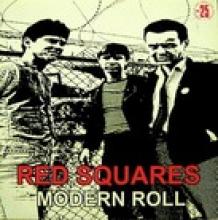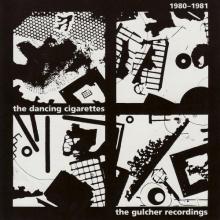Red Squares: Arizona does KBD
Eddy Current Suppression Ring: Down Under with Instrumentals
There’s still a punky attitude pushing through ECSR’s Primary Colours from back in 2008. It’s not of the spiky haired variety, but it’s there in all the snotty glory one would expect. The thing is, the band still doesn’t sound too far different than whatever local garage cum punk bands are kicking around your hometown right now. Songs like “You Let Me Be Honest with You” find the group coming pretty close to plain old loosing tempo and flubbing notes. It’s not that the highest level of performance is expected from this Australian cohort, but the preceding get pretty dodgy at times. Saving the band from mediocrity, the instrumental “That’s Inside of Me” crops up in all its minimal glory. The four minutes it takes to get through the song might not offer too many unique variants, but the one chord everyone plays is a good one.
Marvelous Darlings: A Northern Pop
For the most part, Teenage Lobotomy hasn’t steered me towards anything I regret hearing. That’s not any different after having heard Marvelous Darlings. At the same time, though, I might rather listen to my roommate have a go at dropping a deuce in the morning before heading out to work. The band, a Canadian one at that, deals in punk, but of the poppiest variety possible. There’s no Blink 182 nonsense here. Or Green Day. But the guy who fronts this group can actually sing, which in a lot of cases, this one specifically, changes the music’s dynamic. A guy with a voice always sounds like he’s got one, even if fronting a hardcore band. So, taking that pent up punk energy and running it across a spate of singles – there’re six over at TL – resulted in something of an inconsistent listen despite my dismay after hearing “I Don’t Want to Go to the Party.”
By the time listeners make it to 2009’s Sleeping Like A Dead Man and it’s second track, “Call it a Night,” and that acoustic guitar, not to mention the harmonica, it’s just about time to give up. There’re a few moments of success, but not enough to warrant a further investigation.
Bobby Soxx - "Learn to Hate in the '80s" (Video)
Bobby Sox ain't bad. But I'm gonna hafta say, it's one of those releases that's benefited from obscurity even if the song's sentiment jives with almost every waking moment of my life.
Dancing Cigarettes - "Razor Hand" (Video)
For whatever reason, Indian bands haven't been fetishized in the same way LA/NY/CLE bands have. And there's no real reason why. The Red Snerts compilation gets its respect, frequently. And these guys were on that disc. But only one song. There's a lot more.
Friction: The Straighter Side of Rock's Avant Gard
Unlike most like-minded ensembles from the New York scene, Friction played in a traditional rock and roll set up, eschewing keyboards and noisome sax accompaniment. Of course, the fact that the band’s first recorded document didn’t arrive until 1980 might explain Atsureki’s lack of aural continuity. But what the album lacked in that particular department, it made up for in its simplistic song structures and delivery.
“Automatic Fru,” like so much of Friction, sports a pretty traditional rock opening, a normal chorus, but then brief sections in which instrumentalists are granted the freedom to explore the more absurd aspects of its craft. The songs were all relatively short, making for only brief rave ups, but the results were engaging, nonetheless.
Albums continued over the next decades, some were compilations. But it seems as if Friction is set to remain a relatively obscure group in the States despite DNA’s relative acclaim from underground afficianados. Recognition wasn’t necessarily the point of any of this, though. So, no great loss. At least Friction remains a pretty astute distillation of the straighter side of rock’s avant garde.
Dancing Cigarettes: Bloomington's Required Listening
There’s still no reason why chicks in bands play bass more frequently than other instruments. If someone can explain that – and surely, someone can in a weird sociological manner – go right ahead. It’d be interesting. While you’re doing that, though, it wouldn’t be a bad idea to listen to Bloomington, Indiana’s Dancing Cigarettes, which was a part of the Gulcher stable and made an appearance on the inimitable Red Snerts compilation back in 1981.
Over the years, a pair of compilations have cropped up in attempts to properly collect that band’s record works, 1980-1981: The Gulcher Recordings being the latest. Of course, “Broken Windows,” from the aforementioned Red Snerts disc is included. The song isn’t exactly representational of the band as a whole, but since Dancing Cigarettes didn’t seem to have a concerted sound at work, that shouldn’t be a surprise. This track, though, goes off as more aggressive than some of the funkier works the band turned in over time. It’s not hardcore, to be certain, but fellow Bloomington residents, the Zero Boys, would have done well to have a set of pipes as ferocious as these.
Collecting the remainder of the band’s studio output, which only includes one single, a number of live tracks are tacked on to the end of the disc, comprising a larger portion of its runtime than anything else. These live features, though, find Dancing Cigarettes sounding as assured as in the studio. One could even make the argument that the first half of “Eggs Any Style/Diet Of Worms,” an instrumental affair, ranks as the bands defining moment. Granted, it’s only about two and a half minutes worth of music. But in that time, Dancing Cigarettes rave up a funky back beat, the keyboards function as simple melody for a bit before devolving into willfully artsy noise and the guitar slashes through the rest of it.
What’s most surprising about 1980-1981: The Gulcher Recordings isn’t that the band’s been forgotten for no good reason, but that the recording quality during that live set outstrips a number of works from contemporaries in their garages. Maybe the college town had a handful of properly educated sound design folks. Who knows what the reason is. But if Midwestern underground rock stuff from that latter portion of the punk era’s something getting air time in your car or on your headphones, Dancing Cigarettes might rank as required listening.
No Wave and Byron Coley
If you happened to have picked up No Wave: Post-Punk. Underground. New York. 1976-1980.- and you should – it should have been immediately apparent that Thurston Moore’s name appears before Byron Coley’s. Granted, having been witness to at least some of what the book details probably makes Moore a decent commentator. But the fact that a guy whose made his life’s work writing on music while hocking rare records shouldn’t get second billing. Marketing’s a mother, huh?
Anyway, in similar fashion to earlier volumes like Please Kill Me and We Got the Neutron Bomb, No Wave attempts to chronicle an insular music scene through a wealth of interviews. What differentiates this tome from others, though, is the sporadic narration that goes along with the oral history. It may have been necessitated by the book focusing on a more narrow music and including less players, but it’s a nice touch, taking readers out of the first person stuff. That isn’t the only thing making No Wave an easier read than those other non-fiction works.
As opposed to Please Kill Me, which includes at least five years worth of history leading up to the CBGB’s scene, No Wave jumps right in. Of course, seeing as whatever counts as No Wave lasted something like four years, Coley and Moore were working with a refined palette, one excluding excess. Yeah, it’d be easy to read this thing in one day, but No Wave arriving as a coffee table book suites its purpose. The music showed up, didn’t change and then went away. There’s no time to waste while wading through these interviews – even if some of the same characters are at work in earlier volumes detailing the underground.
What’s remarkable about this book is the wealth of photographic evidence all these people left behind and apparently took care of over the years. Pictures of people hanging out, playing on the street – or rooftops – serve to make the rather slim volume something more engaging than a textual investigation of history. So many of the people involved with music were simultaneously working in other mediums. I suppose then, it’s no revelation that folks toted cameras around. Thanks to the investigation centering on New York, there seemed to people with workable equipment even if those same people were apparently poverty stricken. There certainly isn’t the same sort of coverage in the Detroit or other Midwestern scenes. But it’s the Midwest…
The Record Players - "Parasite City" (Video)
If you happen to be into the Desperate Bicycles, you already like the Record Players and you don't know. Can't figure if these guys were a Rough Trade group, but it would make sense. Either way, good punk cum pop. Play on repeat.




